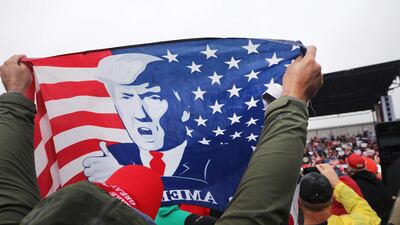The US on Monday announced new sanctions against Iran’s national oil and tanker companies as the Trump administration makes it harder for Joe Biden to return to the nuclear deal should he win the election.
The US Treasury Department added more designations against the National Iranian Oil Company, the National Iranian Tanker Company and the Ministry of Petroleum.
The sanctions also hit 21 other entities, people and ships, three of which were used to deliver Iranian oil to Venezuela, the US Treasury Department said.
“The few remaining buyers of Iranian crude oil should know that they are helping to fund Iran’s malign activity across the Middle East, including its support for terrorism,” Secretary of State Mike Pompeo said.
Treasury Secretary Steven Mnuchin said that “the regime in Iran uses the petroleum sector to fund the destabilising activities” of the Islamic Revolutionary Guard Corps and its Quds Force.
“The Iranian regime continues to prioritise its support for terrorist entities and its nuclear programme over the needs of the Iranian people," Mr Mnuchin said.
US President Donald Trump had already sanctioned Iran’s Petroleum Ministry, and its national oil and tanker companies, when the US withdrew from the nuclear deal between Tehran and world powers in 2018.
Mr Biden said he would re-enter the nuclear deal if Iran returned to compliance with the accord.
That would require Washington to lift the crippling sanctions that have formed the basis of Mr Trump’s maximum pressure campaign against Ira.
But Iran hardliners within the Trump administration hope that more designations to entities under counter-terrorism laws will make it harder for former Mr Biden to repeal them if he entered the Oval Office in January.
"In some of these cases we put sanctions in place under counter-terrorism authorities," Mr Trump's special representative for Iran and Venezuela, Elliott Abrams, told The National.
“To lift those sanctions requires stating that Iran is not engaged in supporting terror. So how do you reverse that? You don’t.”
The Trump administration used counter-terrorism authorities to designate other Iranian entities last year, including the Quds Force, the IRGC's overseas operations branch.
The Foundation for Defence of Democracies has likened this strategy to building an “Iran sanctions wall” as a shield against a revival of the nuclear deal.
Behnam Ben Taleblu, Mark Dubowitz and Richard Goldberg – who previously advised Mr Trump on Iran policy – recently repeated their case for fortifying the sanctions wall in an article for the Jewish Policy Centre.
“The designation of the central Bank of Iran for funding terrorism, the designation of the IRGC as a foreign terrorist organisation and the redesign of many of the sanctions to make them based on terrorism, missile proliferation or connections to the IRGC will pose significant risks to all multinational companies,” they wrote.
“Few believe the risks of Tehran’s illicit conduct will diminish even if a Biden administration lifts sanctions.”
The Trump administration this month designated nearly the entirety of Iran's financial sector, seeking to cut Tehran off from the global financial system.


